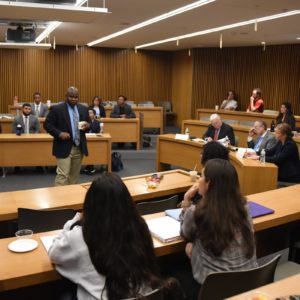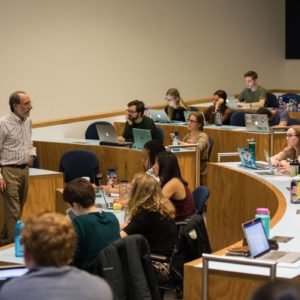No matter what kind of application process you’re working through, you’ll likely need some letters of recommendation. There are a lot of common misconceptions about how to go about securing these letters that I will explain here; I hope this post will help clear some of them up!
Preparing for Academic Work in Foreign Languages
Last summer, I visited my native country, Honduras, for the first time in 10 years. Because I did not get to experience a lot of the culture while I was living there during my childhood, my family and I planned a trip across some of the most historically rich landmarks in the country, including the Mayan ruins.
To learn the most during the trip, I knew I would have to complete some preliminary research on my own to acquaint myself with the history and culture in general, which of course meant reading research papers and articles in Spanish. I knew this task would be difficult, because despite the fact that I lived in Honduras for 10 years and had been speaking Spanish at home my entire life, I had never read or written academic work in Spanish.
Whether you are reading sources in other languages, preparing to go abroad for research, or writing for a class or independent work in a foreign language, completing this task will be different than completing an assignment in English. In this post, I will highlight my two biggest take-aways on how to prepare to engage with scholarly work in another language.
Continue reading Preparing for Academic Work in Foreign Languages
Tips for Synthesizing Information

One of the challenges of college is assimilating large amounts of information from a variety of sources: lectures, course readings, independent work research, precept discussions, extracurricular programming—the list goes on and on. Compounding the challenge is the fact that what’s ultimately demanded of students is not mere recall, which can be accomplished through memorization. Rather, we’re charged with synthesizing disparate materials, pulling things together, making connections across genres of information. In this post, I reflect on some of the ways I try to do this. Continue reading Tips for Synthesizing Information
What to do when Courses Require Instructor Permission
It’s that time of year again: everyone is spending endless amounts of time browsing and discussing the available spring courses with their friends, advisers, and mentors. The buildup is for good reason: it’s important to put together a balanced, enjoyable course schedule (for tips on how to go about doing that, check out this post).
I’ve personally had my eye on NEU 350, the neuroscience major requirement known for teaching data analysis techniques and lab procedures. Thus far in my Princeton career, I’ve learned a lot about theoretical methods within the discipline, but I’ve yet to actually apply those methods myself and work with real data. I wanted to take the class to learn these skills and broaden my understanding of what actual work within the neurosciences looks like.
However, I noticed under the “Prerequisites and Restrictions” header of the course on the registrar website that sophomores need permission from the Instructor to take the course. I found this odd considering that many sophomores are enrolled in NEU 314, a class that is typically taken by neuro majors the semester before NEU 350. The need for instructor permission felt intimidating to say the least, and in this post, I’ll share a few steps I took to learn more about NEU 350 and whether or not I should take it this spring.

Continue reading What to do when Courses Require Instructor Permission
Connecting with Scholars beyond Princeton
It’s been almost four years, and the generosity of Princeton faculty continues to surprise me. So many professors here are not just accessible to students, but deeply invested in supporting us in and outside of the classroom. It typically isn’t too hard to find at least one research mentor among our 950 full-time faculty.
Nevertheless, one institution’s faculty cannot possibly cover every sub-field or research topic. This has become especially apparent as I’ve moved towards the specificity required of a thesis project. In my case, no professor on campus studies Vilna, the Eastern European city at the center of my thesis.

Of course, there are ways around this. For one, there is probably a professor on campus whose area of expertise has something in common with your project. My thesis adviser does not work on Eastern Europe, for example, but she is an expert in writing urban histories. So even though Vilna is new to her, she has been invaluable in guiding my methodology and argumentation.
She has also encouraged me to reach out to faculty and graduate students in other departments and at other institutions who might be more familiar with Vilna itself. Connecting with these scholars has turned out to be one of the most valuable aspects of my thesis process thus far. I’ve compiled some tips for accessing the rich academic network beyond your particular department or university.
Coursework and Independent Work: Using One to Guide the Other
Choosing a topic for independent work can be a challenging task. It can be difficult to narrow down the seemingly infinite research topics to one that you find compelling (see my post here with tips on how to do that), and on top of that, you have to juggle your research with coursework that may be unrelated. It isn’t always easy to switch gears between, say, literary criticism and your STL. That said, your coursework need not be totally separate from your independent work, and need not even parallel your independent work at the exact time you are conducting it. With courses for the spring semester just released, I want to suggest ways that you can structure your selections to complement (and even supplement!) your own research. This way, next semester, your own independent work may not actually be so “independent” after all. Continue reading Coursework and Independent Work: Using One to Guide the Other
Why You Should Join a Research Journal: An Interview with PURJ Co-Editor-in-Chief Jasper Lee ’21
Since coming to Princeton, I’ve become involved in diverse publishing and editing opportunities. One of the first undergraduate publications I joined was PURJ, the Princeton Undergraduate Research Journal. As a member of the Peer Review Board for PURJ, I learned more about the peer review process in academic research publications and had the opportunity to review manuscript pieces spanning incredibly diverse disciplines from the undergraduate body. In contrast to some other more specialized journals I’m involved in, such as Unfound, Princeton’s Journal of Asian American Studies, PURJ is a truly multidisciplinary publication that showcases work from the humanities, social sciences, natural sciences, engineering, and arts.
To learn more about the perks of being involved in a research journal, I interviewed Jasper Lee ’21, the current Co-Editor in Chief of PURJ. A molecular biology major, he first joined PURJ as a member of the Peer Review Board and then took on the role of Managing Editor of Peer Review. Here’s what Jasper shared about his experience with PURJ:
Summer Anxiety? A Case for Pursuing Research
It’s officially November here at Princeton: the leaves have changed, midterms are over, and fall break is but a blissful memory. If you’re anything like me, this means that you’ve finally settled into the rhythm of the semester. However, it also means that the question you’ve likely been avoiding since the beginning of the year–what will I do this summer?–is becoming harder and harder to ignore, as deadlines that once seemed distant are now imminent.
As a first-year, I remember that this pressure seemed terrifyingly intense. I was surrounded by sophomores, juniors, and seniors who were anxiously applying to dozens of positions, interviewing, and accepting offers–while I was still busy trying to make friends and adjust to the demands of Princeton’s fast-paced schedule. How could I know what I wanted to do with my summer when I wasn’t even confident in my extracurriculars or my concentration?
If you relate to this sentiment at all, don’t fret. The answer to your woes? Spend a summer doing research! Princeton provides an incredible number of summer research opportunities that span a wide range of fields. If you’re uncertain of your major (like I was!) or don’t know what you want to do with your life, I’d argue that a summer spent doing research can be beneficial for a wide variety of reasons.
Continue reading Summer Anxiety? A Case for Pursuing Research
Why You Should Talk to Your Friends About Your Research

A professor recently offered this advice in class: if writing a paper isn’t going well—if you’re feeling the notorious “writer’s block,” for instance—then try writing a letter instead. In his view, this needn’t be a real letter to an actual person. The main point is to try to explain what you hope to achieve in a different way to a different audience.
Though I’d never tried letter writing of this sort before, I immediately appreciated my professor’s advice because of how it connects to a practice I’ve implemented in my own life for quite a while. That strategy is to “talk it out”—to take a break from a task that’s frustrating me and talk through the problem with a friend. This is the first reason that I think talking about research is helpful for each of us: it helps us clarify our aims and work through challenges. Continue reading Why You Should Talk to Your Friends About Your Research
Mid-semester Reflections: Knowing When to PDF a Class
Last spring, I began the semester specifically planning to PDF my English class. I knew my schedule would be time-consuming, since in addition to English, I was also taking immunology, organic chemistry, intro to material science, and Portuguese. Because I intended to count all of my other courses as either CBE departmental electives or towards a Portuguese certificate, so I thought it would be wisest to PDF English.
However, half-way through the semester, I realized that I was doing relatively well with the English coursework, so I probably did not need to PDF the course. The course that was actually more time-consuming and difficult than I had expected was immunology. This caused me to rethink my process for choosing how to select a course to PDF. I started to look at the course load itself instead of just at the requirements I was satisfying, and in the end, I chose to PDF immunology. In this post, I will discuss in more detail some things I considered before making my decision and offer tips for selecting to PDF a class.

Continue reading Mid-semester Reflections: Knowing When to PDF a Class

